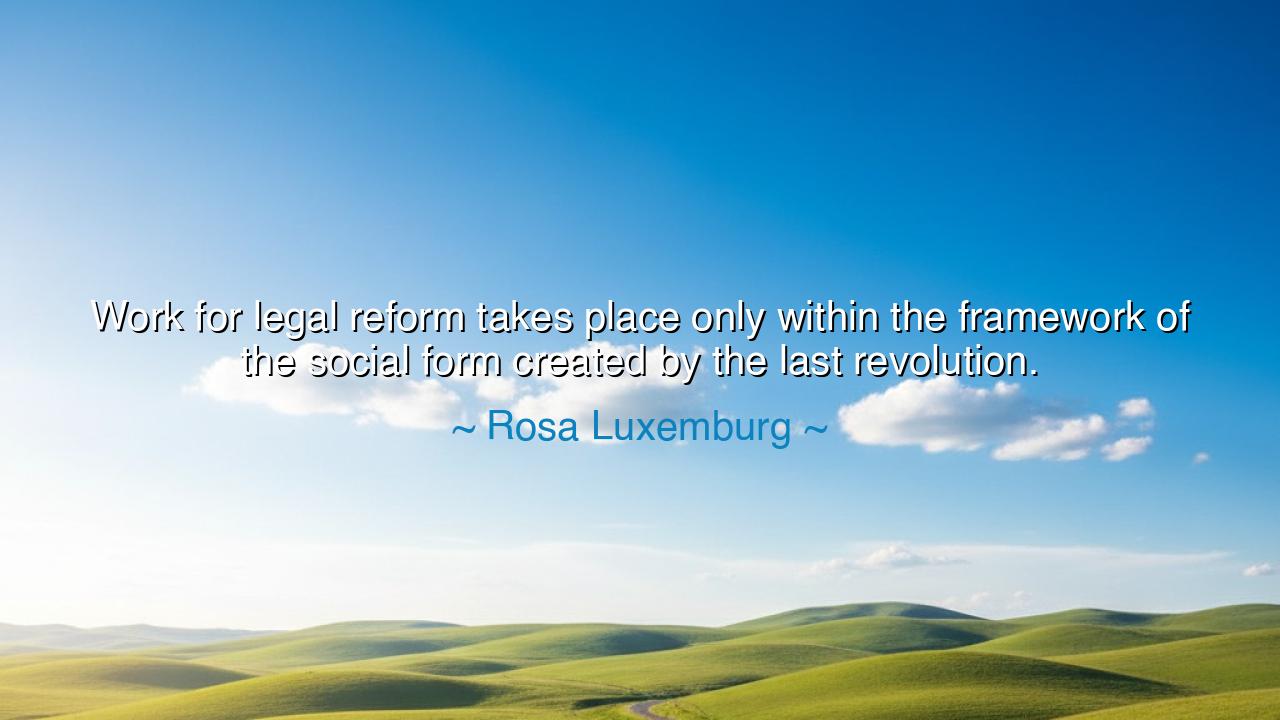
Work for legal reform takes place only within the framework of
Work for legal reform takes place only within the framework of the social form created by the last revolution.






The words of Rosa Luxemburg resonate with the weight of historical wisdom: “Work for legal reform takes place only within the framework of the social form created by the last revolution.” In this reflection lies a profound understanding of the interplay between law, society, and change. Luxemburg reminds us that law is not a static artifact, nor can it be reformed in isolation from the social structures that sustain it. Every legal system, every statute, is a child of its historical moment, born from the upheavals, struggles, and victories of the last great transformation. Reform, therefore, must reckon with the inherited framework, navigating it carefully even as it seeks to reshape it.
The origin of this insight lies in Luxemburg’s work as a revolutionary thinker and theorist of social change. Observing the dynamics of early 20th-century Europe, she recognized that legal systems are intertwined with social and political realities. To attempt reform without acknowledging the foundations laid by prior revolutions — whether political, industrial, or social — is to fight against the current of history itself. In her eyes, law is inseparable from society; it reflects prevailing power relations and cultural norms, and its possibilities for change are always constrained by the structures already in place.
The ancients, too, understood this principle. In Athens, after the overthrow of tyrants and the establishment of democracy, new laws were enacted, but always within the framework of existing civic structures. Socrates taught that reforms must consider the deeply rooted habits and institutions of the polis; to ignore them is to invite chaos rather than progress. Luxemburg’s words echo this timeless caution: revolutions leave their imprint not only on the hearts of the people but on the architecture of governance, and reformers must work within these inherited forms to achieve lasting change.
Consider the English Civil War and the subsequent legal transformations of the 17th century. The abolition of the monarchy temporarily altered political power, but legal reform still operated within frameworks inherited from centuries of common law. Parliament, while asserting new authority, could not simply erase precedent; statutes, judicial customs, and property rights constrained the scope of change. Like Luxemburg notes, meaningful reform was bound to the social form created by the last revolution, and progress depended upon understanding and navigating that structure, rather than attempting to leap beyond it.
Luxemburg’s observation also highlights a subtle truth about the nature of social struggle: reform is often gradual, iterative, and embedded in existing institutions. Revolutionary fervor may inspire visions of sweeping transformation, but law and society are resistant to instant change. The Bolsheviks, for instance, faced the challenge of reshaping Russian legal and economic structures after 1917. While ideology demanded radical innovation, practical governance required operating within remnants of the old imperial bureaucracy, illustrating the constraints Luxemburg describes.
The lesson extends beyond political upheaval to all forms of social improvement. Activists, policymakers, and reformers must recognize that legal frameworks are products of historical struggle, and that successful reform requires both vision and pragmatism. Attempting to impose change without understanding existing structures often leads to resistance, inefficiency, or failure. The social and legal realities left by previous revolutions form the stage upon which reformers must act — the scaffolding that supports or hinders every new initiative.
This principle is also evident in modern examples of civil rights reform. The movement to advance voting rights in the United States had to work within constitutional frameworks, legal precedents, and state institutions established long before the 1960s. Activists could not simply declare universal suffrage; they leveraged the existing legal and social structures to push forward change, gradually transforming the system. Luxemburg’s words illuminate this strategy: reform is effective when it navigates inherited forms with intelligence, courage, and persistence.
Thus, the wisdom of Rosa Luxemburg endures across generations: law is never divorced from society, and reform is never free-floating. To change the world, one must understand the framework created by the last revolution, respecting its constraints while pushing its boundaries. Activists and thinkers must blend ambition with pragmatism, vision with strategy, and courage with humility. In this delicate balance lies the path to lasting justice, progress, and the enduring evolution of society.






AAdministratorAdministrator
Welcome, honored guests. Please leave a comment, we will respond soon